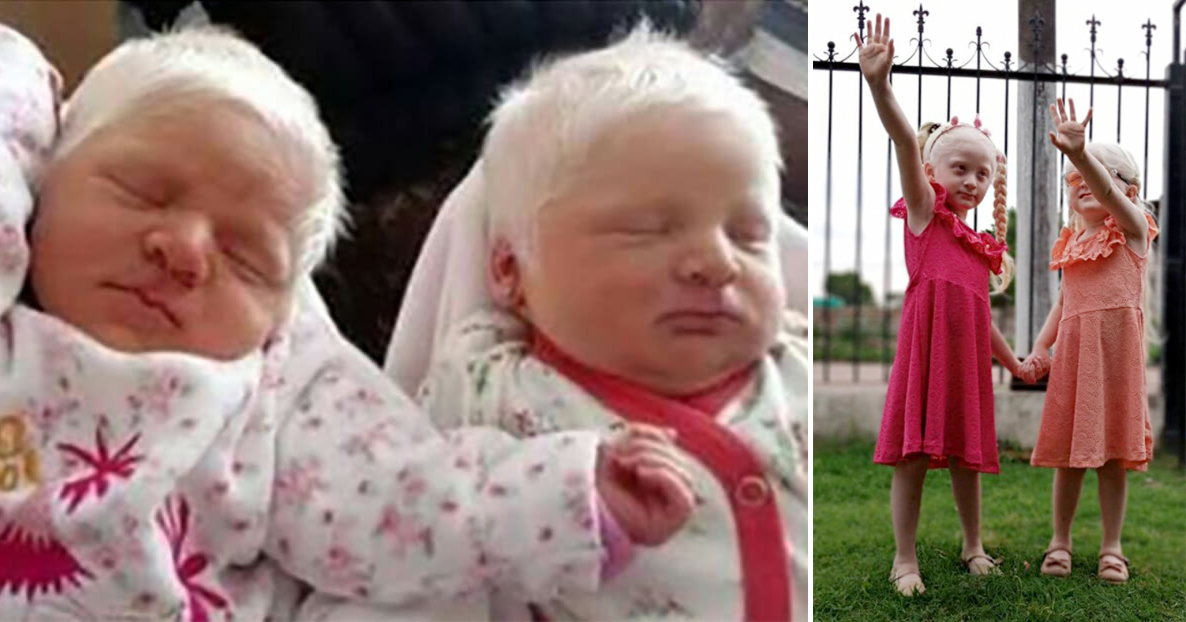Disclaimer: This article is for informational and inspirational purposes only. All information is based on publicly available and verifiable sources. The story aims to promote awareness and appreciation of diversity, not to sensationalize or exploit personal circumstances. For more information about albinism, please refer to resources from medical and advocacy organizations such as the National Organization for Albinism and Hypopigmentation (NOAH).
Meet Argentina’s First Albino Twins: A Rare and Beautiful Story Captivating the World
When Virginia and Catalina were born in 2018, their arrival immediately caught international attention — not because of fame, fortune, or controversy, but because their birth represented something rare, beautiful, and inspiring. The two sisters, born in Tucumán, Argentina, were reported to be the first known albino twins in the country’s history, and their story continues to capture hearts worldwide years later.
Their pure white hair, fair skin, and bright smiles are not just striking in photographs — they also tell a story about diversity, genetics, and the beauty of uniqueness. As images of the twins circulated on social media, millions were drawn to their charm and the warmth of their family, who have chosen to embrace and celebrate their daughters’ individuality.

A Family’s Joy: The Birth of Virginia and Catalina
In 2018, Jorge Gómez and his wife welcomed twin daughters Virginia and Catalina into their growing family. The couple already had one son, and the addition of two daughters brought even more happiness into their lives. Their birth was perfectly healthy, and the family described the twins as a “double blessing.”
The moment doctors saw them, everyone in the delivery room realized they were witnessing something extraordinary. Both girls were born with snow-white hair — a result of a rare genetic condition known as albinism, which affects the production of melanin in the skin, hair, and eyes.
While albinism is often misunderstood, the Gómez family viewed their daughters not as different, but as extraordinary in their own way. They shared their joy publicly, and soon, their story spread far beyond Argentina’s borders.

Understanding Albinism: Beyond Appearances
Albinism is a genetic condition caused by the absence or reduction of melanin, the pigment that gives color to hair, skin, and eyes. It occurs in people of all ethnic backgrounds and is inherited when both parents carry the same gene responsible for the condition.
Globally, it’s estimated that about 1 in 18,000 to 20,000 people are born with albinism, but the occurrence of identical albino twins is extremely rare — making Virginia and Catalina’s birth an extraordinary event in medical and human-interest history.
While albinism can increase sensitivity to sunlight and sometimes affect vision, people with the condition live healthy, fulfilling lives. Awareness and education have become key in challenging stereotypes and celebrating genetic diversity. The twins’ story plays an important role in spreading that awareness.
From Viral Sensation to Inspiration
Not long after their birth, photos of Virginia and Catalina were shared online, quickly going viral. The world was fascinated by their appearance — bright hair, soft complexions, and joyful expressions. News outlets and lifestyle blogs from different countries published stories about them, calling the twins “living proof that beauty comes in all forms.”
As often happens, the viral wave eventually faded, and public attention moved on. But recently, new photos of the twins resurfaced on social media, sparking another wave of admiration. Now a few years older, Virginia and Catalina continue to enchant online audiences with their smiles and sibling bond.
Their family remains grateful for the positivity and love they’ve received from around the world, while also encouraging people to see beyond appearances and appreciate every child for their uniqueness.

Celebrating Diversity and Inclusion
The story of Argentina’s first albino twins has helped highlight a broader message about inclusion and representation. For many families affected by albinism, visibility matters — and stories like Virginia and Catalina’s can challenge outdated stereotypes and promote understanding.
In Argentina and other parts of Latin America, organizations that advocate for people with albinism have praised the Gómez family for embracing their daughters publicly and positively. Representation in media plays a powerful role in normalizing differences, and the twins have become symbols of that change.
Parents around the world have shared similar experiences online, expressing gratitude for seeing stories that show albinism in a loving, human way — without pity, sensationalism, or stigma. Many believe that the more people see such examples, the more society will recognize that beauty exists in every shade.
How the Family Views Their Journey
Despite the media attention, Jorge and his wife have tried to keep life as normal as possible for their children. In interviews with local press, they expressed deep pride in their daughters’ uniqueness and happiness. “They are just like any other kids,” one parent said. “We want them to grow up knowing that what makes them different is also what makes them special.”
The family’s outlook reflects a simple but powerful truth: every child deserves to be loved, accepted, and celebrated for who they are. Their story is not just about genetics — it’s about family, love, and acceptance.
A Message of Hope and Awareness
Virginia and Catalina’s story continues to inspire people far beyond Argentina. Schools and advocacy groups have used their example to promote awareness about albinism, reminding everyone that inclusion starts with understanding.
For many, these twins represent a new generation of awareness and acceptance — a sign that the world is slowly learning to appreciate diversity in all its forms. Their parents’ decision to share their story has brought visibility to a condition often overlooked or misunderstood, turning what could have been seen as rare into something remarkable and beautiful.
A Reminder About the Power of Stories
In the digital age, stories spread fast — but the most meaningful ones stay because they touch something deeper in us. The birth of Virginia and Catalina Gómez did exactly that. It reminded the world that beauty isn’t a standard to be measured or judged; it’s something that lives in uniqueness, love, and connection.
The renewed attention around the twins is not just a celebration of their rare condition but a tribute to the human spirit — to families who choose love over fear, and to communities that learn to see differences not as divisions but as reflections of nature’s endless creativity.
Conclusion
Virginia and Catalina’s journey began with surprise and wonder, but today it stands as a beacon of awareness, acceptance, and hope. Their story transcends borders, showing that the rarest things in life are often the most beautiful. From a small town in Argentina to news outlets across the globe, their presence continues to inspire people to appreciate diversity in all its forms.
Their parents’ message remains clear: “Every child is a gift. What makes them different makes them extraordinary.”
And as these two remarkable sisters grow, the world will surely continue to follow — not out of curiosity, but admiration.
